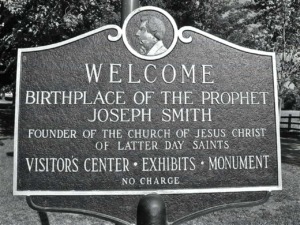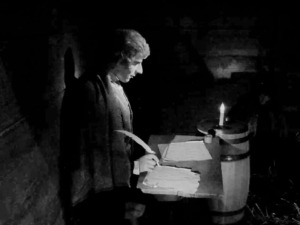"The Revelation of Jesus Christ, which God gave unto him, to shew unto his servants things which must shortly come to pass; and he sent and signified it by his angel unto his servant John." (Revelation 1:1 – KJV)
"The revelation of John, a servant of God, which was given unto him of Jesus Christ to show unto his servants things which must shortly come to pass, that he sent and signified by his angel unto his servant John." (Revelation 1:1 – JST)
Notable changes to Revelation 1:1:
• KJV: Revelation of Jesus Christ. It is written, "the Revelation of Jesus Christ, which God gave unto him."
• JST: Revelation of John. It is written, "the revelation of John, a servant of God, which was given unto him of Jesus Christ."
The King James Version (KJV) of Revelation 1:1 describes the Revelation as being given by God to Jesus Christ. He then gives the message to his servant John through an angel. This structure highlights the divine origin for revelation. It emphasizes the role of Jesus Christ as the mediator between God and humanity. The Joseph Smith Translation (JST) changes the subject of the sentence, attributing the revelation directly to John. It also states that Jesus Christ gave the revelation to John, not referring to God the Father. The absence of the Father giving this message to Jesus changes everything.
The KJV version depicts John as the receiver of the revelation. Compared to the JST, it is different in how he received it. On the hand, the KJV identifies the contents of the book of Revelation as “the Revelation of Jesus Christ”, where the JST identifies the contents of this book as the “revelation of John.” So, the variations revolve around who is given the revelation and who delivers it to John. This is a big distinction in how this happens when comparing the two translations. I speak of translations lightly since the Joseph Smith Translation is not a translation at all. Instead, it is a literal change to the King James Bible.
"Blessed is he that readeth, and they that hear the words of this prophecy, and keep those things which are written therein: for the time is at hand." (Revelation 1:3 – KJV)
"Blessed are they who read and they who hear and understand the words of this prophecy and keep those things which are written therein. For the time of the coming of the Lord draweth nigh." (Revelation 1:3 – JST)
Notable changes to Revelation 1:3:
• KJV: A person is blessed, who reads and hears the words of this prophecy. It is written, "blessed is he that readeth, and they that hear the words of this prophecy."
• JST: People are blessed, as they read, hear, and understand the words of this prophecy. It is written, "blessed are they who read and they who hear and understand the words of this prophecy."
• KJV: The time for this prophecy to come to pass is soon. It is written, "for the time is at hand."
• JST: The time for Jesus's second coming is soon. It is written, "for the time of the coming of the Lord draweth nigh."
The King James Version (KJV) of Revelation 1:3 mentions that those who read, listen, and keep the words of this prophecy are blessed. We may not understand all things, but we are to obey. This is especially true given the urgency of the time we are living in. However, there are specific differences between the two verses. #1, The pronoun at the beginning starts with “he that readeth” in the KJV, while the JST starts with “they who read”. So instead of a person reading and gaining insight for themselves, they gain insight collectively as a group. #2, The JST includes understanding the prophecy as a condition for being blessed. However, the KJV version does not mention the need for understanding. This is because God gives us true understanding. We can get into trouble when we interpret the Bible without the Holy Spirit.
There are more issues when looking at the different translations. #3, In the KJV, “the time is at hand” is speaking of the events that will take place in this prophesy. This verse emphasizes the urgency of the message and the importance of paying attention to the words of the prophecy. On the other hand, the JST changes this to, “the time of the coming of the Lord draweth nigh”. This refers to the Second Coming of our Lord Jesus, which is not what the verse is meaning. Instead, the time for the prophecies in this book to come to pass is coming soon. Therefore, Joseph tried to clarify the timeframe in this verse with the Second Coming, instead of the prophecy in general. This removes the timing of the events in this prophecy while putting our attention on Jesus's return. We believe Jesus will return soon, but changing the details like this is wrong.
"John to the seven churches which are in Asia: Grace be unto you, and peace, from him which is, and which was, and which is to come; and from the seven Spirits which are before his throne." (Revelation 1:4 – KJV)
"Now this is the testimony of John to the seven servants who are over the seven churches in Asia. Grace unto you and peace from him who is and who was and who is to come, who hath sent forth his angel from before his throne to testify unto those who are the seven servants over the seven churches. Therefore I John, the faithful witness, bear record of the things which were delivered me of the angel." (Revelation 1:4 – JST)
Notable changes to Revelation 1:4:
• KJV: Seven Spirits are mentioned. It is written, "from the seven Spirits which are before his throne."
• JST: Seven servants are mentioned in place of Spirits. It is written, "now this is the testimony of John to the seven servants." "The seven servants over the seven churches."
• JST: An extra phrase was added to this verse. It is written, "to testify unto those who are the seven servants over the seven churches. Therefore I John, the faithful witness, bear record of the things which were delivered me of the angel."
The King James Version (KJV) of Revelation 1:4 begins with John addressing the seven churches in Asia. He extends grace and peace from the eternal and transcendent God, and the seven Spirits before his throne. This imagery emphasizes the divine origin of the message and the unity between God and his angels. The Joseph Smith Translation (JST) identifies the recipients as the seven servants who oversee the seven churches. This puts emphasis on their leadership roles. It is important to note that in the KJV, the “seven Spirits which are before his throne”, while the JST speaks of an angel that was sent from before His throne.
The JST attempts to include an additional description of John’s role as a faithful witness. How he wrote down things that were delivered to him by the angel. However, this is not present in the KJV version, and therefore, not important to the verse. It also mentions that John was giving his testimony when he wrote to the churches. However, this was never stated in Revelation either. It was Joseph Smith who thought he could add more context and detail to the book. In so doing, he added his opinion to the verses. What was important in scripture was changed in a way that it didn't make sense anymore. This took away from the true meaning of the verse.
"Behold, he cometh with clouds; and every eye shall see him, and they also which pierced him: and all kindreds of the earth shall wail because of him. Even so, Amen." (Revelation 1:7 – KJV)
"For behold he cometh in the clouds with ten thousands of his saints in the kingdom, clothed with the glory of his Father. And every eye shall see him. And they who pierced him and all kindreds of the earth shall wail because of him. Even so, Amen." (Revelation 1:7 – JST)
Notable changes to Revelation 1:7:
• KJV: Jesus will return with the clouds. It is written, "behold, he cometh with clouds."
• JST: Jesus will come in the clouds. It is written, "behold he cometh in the clouds."
• JST: An extra phrase was added to the verse: It is written, "with ten thousands of his saints in the kingdom, clothed with the glory of his Father."
The King James Version (KJV) of Revelation 1:7 is concise and direct, stating that Jesus "cometh with clouds" and "every eye shall see him." It also declares that "all kindreds of the earth shall wail because of him." This imagery conveys the awe-inspiring nature of Jesus's return, and the profound impact it will have on all humanity. The JST expands on this description by adding several significant details. First, it states that Jesus Christ will come "in the clouds with ten thousands of his saints in the kingdom." This detail comes from Jude. It is written, "and Enoch also, the seventh from Adam, prophesied of these, saying, Behold, the Lord cometh with ten thousands of his saints." (Jude 1:14)
Furthermore, the JST describes Jesus Christ as being "clothed with the glory of his Father." Joseph Smith was reading in Matthew and thought Jesus should have been described as such. It is written, "for the Son of man shall come in the glory of his Father with his angels; and then he shall reward every man according to his works." (Matthew 16:27) Joseph's translation also tries to clarify those who pierced Jesus Christ. How they, and all the kindred of the earth, will wail because of him. This changes the impact of the coming of Jesus and judgment. How all people, regardless of their actions or beliefs, will be in fear at his return. This is false, as his believers have nothing to fear.
The KJV's description of Jesus Christ's second coming is concise and powerful. The JST's tries to add depth and richness to his account, which is unneeded. As he thought things were missing, he just added things in. What he thought was supposed to be written mattered. It is as if he got the same revelation as John but wanted to add to the story. So, he added many details, while removing much of what was written, and changing other things. The JST puts the emphasis on the grandeur of Jesus's return with the saints. How the Lord will return in divine glory, and the universal nature of his judgment. Both versions convey the idea of a majestic and awe-inspiring return of our God and King. However, the JST tries to fill in the gaps, where the entire meaning of the verse is now changed and thought differently of.
"The mystery of the seven stars which thou sawest in my right hand, and the seven golden candlesticks. The seven stars are the angels of the seven churches: and the seven candlesticks which thou sawest are the seven churches." (Revelation 1:20 – KJV)
"This is the mystery of the seven stars which thou sawest in my right hand, and the seven golden candlesticks. The seven stars are the servants of the seven churches, and the seven candlesticks which thou sawest are the seven churches." (Revelation 1:20 – JST)
Notable changes to Revelation 1:20:
• KJV: Stars are defined as angels of the seven churches. It is written, "the seven stars are the angels of the seven churches."
• JST: Servants are mentioned in place of angels. It is written, "the seven stars are the servants of the seven churches."
The King James Version (KJV) of Revelation 1:20 identifies the seven stars as the "angels of the seven churches." This imagery suggests that each of the seven stars represents an angelic messenger or guardian assigned to a specific church. Angels, in the biblical context, are often depicted as messengers from God, and our protectors. In contrast, the JST changes the description of the seven stars from "angels" to "servants." This alteration shifts the interpretation away from celestial beings and towards earthly leaders or ministers within the seven churches. The term "servants" suggests a more human and practical role. This is possibly referring to pastors, elders, or other individuals responsible for guiding and overseeing the affairs of the churches. However, heavenly beings are not the same as earthly church leaders.
Both versions talk about a connection between the seven stars and the seven churches, but the JST uses "servants" instead of "angels". This highlights the importance of human leadership and supervision within every church. The change is in line with the Mormon belief that earthly priesthood authority and human leaders play an important role in governing and guiding the church. The difference between Revelation 1:20 in the KJV and JST lies primarily in the description of the seven stars. While the KJV portrays them as angelic messengers, the JST depicts them as servants or leaders within the seven churches. Servants, speaking of theological perspectives on the nature of leadership and authority within the church, instead of angels governing them. Joseph's version emphasizes the role of human servants in the governance and oversight of the church.
"Now therefore hearken, O Israel, unto the statutes and unto the judgments, which I teach you, for to do them, that ye may live, and go in and possess the land which the Lord God of your fathers giveth you. Ye shall not add unto the word which I command you, neither shall ye diminish ought from it, that ye may keep the commandments of the Lord your God which I command you." (Deuteronomy 4:1,2)
Moses, in his guidance recorded in Deuteronomy 4:1-2, instructs us explicitly not to add to God's Word. This precept harmonizes with the grave admonitions found in Revelation 22:18-19, which sternly forbids altering the Biblical text. Therein lies a divine warning. It is written, "for I testify unto every man that heareth the words of the prophecy of this book, If any man shall add unto these things, God shall add unto him the plagues that are written in this book: And if any man shall take away from the words of the book of this prophecy, God shall take away his part out of the book of life, and out of the holy city, and from the things which are written in this book." Therefore, modifying the contents of the Book of Revelation has dire repercussions. Adding to the text invites the plagues, mentioned in the Bible, upon a person's life. Deleting from the text leads to a person being excluded from the book of life and the holy city. The promises inscribed within the hallowed records are no longer ours.
The problematic changes to the Book of Revelation, introduced by Joseph Smith, pervert its meaning. There is now discord among those who say they believe in Jesus. Smith's alterations were not only confined to Revelation, but other books. The Joseph Smith Translation (JST) adds to, deletes, rearranges, and alters the text of the King James Version (KJV) Bible. This undermines how sacred the Biblical text is. Such willful distortions are why those who manipulate scriptural prophecy are met with Godly chastisement. As Revelation 20:12-15 tells us, he who is not written in the book of life is destined for the lake of fire. For Joseph Smith, this represents the just reward for his transgressions. It is seen as the fate he now faces postmortem and in hell. This affirms the biblical warning against such wicked actions.
Raising further concern is the embrace of Joseph Smith's new Bible by members of the Mormon church. They advocate that Smith's revisions somehow purify and return the scripture to its untainted state. This is why the JST is linked in the footnotes section of their KJV Bible. People say it gives them insight on how the KJV was supposed to be read. At the same time, the JST disregards the prolific historical evidence that validates the KJV Bible. The integrity of the canonical texts is attested to ancient manuscripts, such as the Dead Sea Scrolls. This corroborates the accuracy of the KJV, while celebrated for its fidelity in translation. It is against this backdrop of scriptural accuracy that the falsehood of Smith's claims is illuminated. This speaks of his standing before God as a false prophet. Joseph awaits God's judgment and the ensuing condemnation to the lake of fire.
Nonetheless, is it acceptable to glean deeper insights from a biblical verse or to produce commentaries aiding comprehension? Indeed, it is. But diverging significantly is the act of changing the scripture's actual words, which is a line Joseph Smith crossed. This man executed thousands of alterations to the text with resolute conviction to his work. Problems arise when modifications were made to the scriptures through the JST. We may not have the original manuscripts, but Word-For-Word Bible translations do not attempt to alter the text. To purposely change sacred texts means a person doesn't care about the consequences in the next life. Joseph has incurred the penalties ascribed to in Revelation. This means that his name was removed from the Book of Life, and that he is now denied access to New Jerusalem. He will be cast into the lake of fire, where he will not participate in the new heaven and new earth.
Joseph Smith trusted in a false god and changed the King James Bible with his own version, called the Joseph Smith Translation. He changed over 3410 verses, including many parts of the Book of Revelation. This suited his own plans, while neglecting what the Word of God says. Seeing that he called himself a prophet, this was a serious rejection of God's Word and preserving what it says. This matches the biblical warning about people being misled by Lucifer when they add to or remove from the prophecy. It is like Joseph did not care about preserving God's Word. He simply saw the Biblical text as flawed, where he needed to step in and correct it. How sickening this was, as he didn't even translate the Bible from an ancient manuscript. Instead, he changed the King James Version Bible. For this reason, Joseph is under condemnation with God. Amen.







